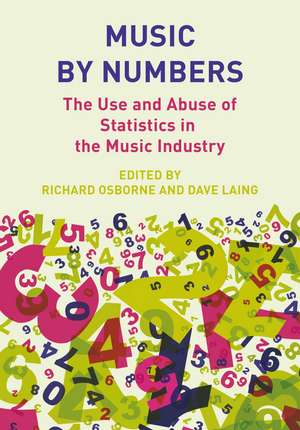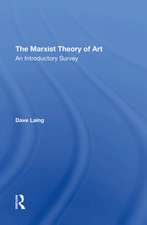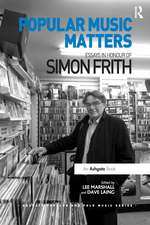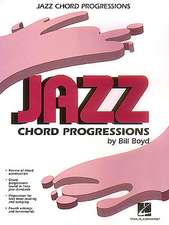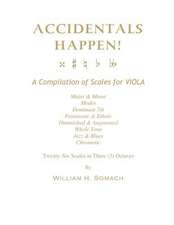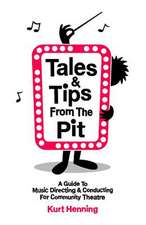Music by Numbers: The Use and Abuse of Statistics in the Music Industry
Editat de Richard Osborne, Dave Laingen Limba Engleză Paperback – 16 feb 2023
An edited volume that examines the data and statistics that are key to the music industry.
The music industries are fueled by statistics: sales targets, breakeven points, success ratios, royalty splits, website hits, ticket revenues, listener figures, piracy abuses, and big data. Statistics are of consequence. They influence the music that consumers get to hear, they determine the revenues of music makers, and they shape the policies of governments and legislators. Yet many of these statistics are generated by the music industries themselves, and their accuracy can be questioned. Music by Numbers sets out to explore this shadowy terrain.
This edited collection provides the first in-depth examination of the use and abuse of statistics in the music industry. Written by noted music business scholars and practitioners in the field, the book addresses five key areas in which numbers are employed: sales and awards; music industry policy; live music; music piracy; and digital solutions. The authors address these subjects from a range of perspectives: some of them test the veracity of this data and explore its tactical use by music businesses; others help to generate these numbers by developing surveys and online projects and offering candid observations.
The aim of this collection is to expose the culture and politics of data. Music industry statistics are pervasive, but despite this ubiquity they are underexplored. This book offers a corrective by providing new ways by which to learn music by numbers.
The music industries are fueled by statistics: sales targets, breakeven points, success ratios, royalty splits, website hits, ticket revenues, listener figures, piracy abuses, and big data. Statistics are of consequence. They influence the music that consumers get to hear, they determine the revenues of music makers, and they shape the policies of governments and legislators. Yet many of these statistics are generated by the music industries themselves, and their accuracy can be questioned. Music by Numbers sets out to explore this shadowy terrain.
This edited collection provides the first in-depth examination of the use and abuse of statistics in the music industry. Written by noted music business scholars and practitioners in the field, the book addresses five key areas in which numbers are employed: sales and awards; music industry policy; live music; music piracy; and digital solutions. The authors address these subjects from a range of perspectives: some of them test the veracity of this data and explore its tactical use by music businesses; others help to generate these numbers by developing surveys and online projects and offering candid observations.
The aim of this collection is to expose the culture and politics of data. Music industry statistics are pervasive, but despite this ubiquity they are underexplored. This book offers a corrective by providing new ways by which to learn music by numbers.
| Toate formatele și edițiile | Preț | Express |
|---|---|---|
| Paperback (1) | 210.23 lei 3-5 săpt. | +31.88 lei 7-13 zile |
| Intellect Ltd – 16 feb 2023 | 210.23 lei 3-5 săpt. | +31.88 lei 7-13 zile |
| Hardback (1) | 538.62 lei 3-5 săpt. | +26.30 lei 7-13 zile |
| Intellect Ltd – 12 feb 2021 | 538.62 lei 3-5 săpt. | +26.30 lei 7-13 zile |
Preț: 210.23 lei
Nou
Puncte Express: 315
Preț estimativ în valută:
40.23€ • 42.00$ • 33.29£
40.23€ • 42.00$ • 33.29£
Carte disponibilă
Livrare economică 15-29 martie
Livrare express 01-07 martie pentru 41.87 lei
Preluare comenzi: 021 569.72.76
Specificații
ISBN-13: 9781789387520
ISBN-10: 1789387523
Pagini: 256
Ilustrații: 11 diagrams
Dimensiuni: 170 x 244 x 18 mm
Greutate: 0.73 kg
Editura: Intellect Ltd
Colecția Intellect Ltd
ISBN-10: 1789387523
Pagini: 256
Ilustrații: 11 diagrams
Dimensiuni: 170 x 244 x 18 mm
Greutate: 0.73 kg
Editura: Intellect Ltd
Colecția Intellect Ltd
Notă biografică
Richard Osborne is a senior lecturer in popular music at Middlesex University in London. He is the author of Vinyl: A History of the Analogue Record and coeditor of Mute Records: Artists, Business, History. He publishes widely in the field of popular music studies, including the blog Pop Bothering Me. Dave Laing (1947–2019) was one of the founding figures of popular music studies. He authored many books on popular music, including The Sound of Our Time, One Chord Wonders, and Buddy Holly.
Cuprins
Richard Osborne, ‘Introduction’
PART ONE: Winners and Losers
PART TWO: Policy
PART THREE: Live Music
PART FOUR: Piracy
PART FIVE: Digital Solutions
PART ONE: Winners and Losers
- Richard Osborne, ‘At the Sign of the Swingin’ Symbol: The Manipulation of the UK Singles Chart’
- Richard Osborne, ‘The Gold Disc: One Million Pop Fans Can’t Be Wrong’
- Richard Osborne, ‘“I Am a One in Ten”: Success Ratios in the Recording Industry’
PART TWO: Policy
- David Arditi, ‘The Global Music Report: Selling a Narrative of Decline’
- Shain Shapiro, ‘Popular Music Funding in Canada’
PART THREE: Live Music
- Adam Behr, Matt Brennan, Martin Cloonan and Emma Webster, ‘Stop Making Census! Some Experiential Reflections on Conducting a Live Music Census’
- Dave Laing, ‘What’s It Worth? Calculating the Economic Value of Live Music’
- Richard Osborne, ‘Live Music vs. Recorded Music’
PART FOUR: Piracy
- Lucas Logan, ‘Selling the Numbers on Music Piracy to Burn Down the Digital Library’
- Lola Costa Galvez, ‘Educar para crear: The Use of Statistics and Surveys in Spanish Music Anti-piracy Policies’
- Vanessa Bastian and Dennis Collopy, ‘Measuring the Unmeasurable’
PART FIVE: Digital Solutions
- Mike Jones, ‘One Penny from Brazil: Music Publishing Revived but Untransformed’
- Marcus O’Dair (Middlesex University), ‘Tokens and Techno-Economic Paradigms: On the Value of Blockchain Technology to the Music Industries’
- Craig Hamilton, ‘The Harkive Project: Computational Analysis and Popular Music Reception’
Recenzii
"A useful read for professionals at any level in the music industry. Each chapter deals with statistics and data in an accessible way without weakening their rigorous critiques of music industry practices. It would be an illuminating read for all artists and music industry professionals."
In a world increasingly reflected and cognized through numerical computation, this well curated collection proves a useful reference resource. Expansive, detailed, and well-researched, Music by Numbers is a commendable contribution to the understanding of our digital age.
In fourteen distinct and loosely connected chapters the contributors variously analyze, dispute, or contribute statistics on the music industries. As Osborne notes in his excellent introduction, the book was Laing’s idea; however, it is largely due to Osborne that this volume saw the light of day, as Laing sadly passed away in January 2019. Osborne was thus forced to contribute more than he had initially planned and wrote all three chapters for Part I on the music industries’ “winners and losers.” These are some of the most interesting chapters of the book. They range in topic from how the United Kingdom singles chart has historically both reflected and driven musical popularity, to the peculiar celebration of sales figures by rewarding gold or platinum status, to the disputable but highly influential rhetoric of the “one-inten” success ratio that is still frequently heard today. Music By Numbers provides popular music scholars with an important and useful foundation for the continued investigation of “the use and abuse” of numbers in the music industries. It is also a fine tribute to the late Dave Laing.
Music By Numbers provides a valuable contribution to our understanding of the use and abuse of data and statistics in the music industries. It employs a critical stance and unpacks the various ways in which numbers are instrumental to industry goals and details various strategies employed to manipulate them accordingly. [...] This book undoubtedly provides useful guidelines for future research on statistics, data and metrics in the music business.
